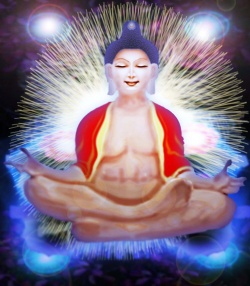Nirmanakaya
Jump to navigation
Jump to search
- See also :
- See also :
Nirmanakaya (Skt. nirmāṇakāya; Tib. སྤྲུལ་སྐུ་, tulku; Wyl. sprul sku), or 'the dimension of ceaseless manifestation', is defined as a rupakaya or 'form body' that arises from the ruling condition of the sambhogakaya and appears as the tamer of various beings, both pure and impure.
When it is divided, there are four kinds:
- Nirmanakaya through birth, such as our teacher taking birth in the heaven of Tushita as the son of the gods, Dampa Tok Karpo.
- Supreme nirmanakaya (Skt. uttamanirmāṇakāya; Tib. མཆོག་གི་སྤྲུལ་སྐུ་, Wyl. mchog gi sprul sku), such as Shakyamuni Buddha who displayed the twelve deeds here in Jambudvipa.
- Diverse nirmanakaya (Skt. janmanirmāṇakāya; Tib. སྐྱེ་བ་སྤྲུལ་སྐུ, Wyl. skye ba sprul sku) that manifest in order to tame various beings from Indra to a young girl.
- Craft nirmanakaya (Skt. śilpinnirmāṇakāya; Tib. བཟོ་བོ་སྤྲུལ་སྐུ་, Wyl. bzo bo sprul sku) such as the manifestation of the lute player in order to tame the gandharva Rabga, and as good food, bridges, pleasure gardens, and islands, as well as sculpted forms, paintings, woven images and cast metal statues.
Or, as Sogyal Rinpoche writes:
- In Tibetan Buddhism the nirmanakaya is envisioned as the manifestation of enlightenment, in an infinite variety of forms and ways, in the physical world. It is traditionally defined in three ways.
- One is the manifestation of a completely realized Buddha, such as Gautama Siddhartha, who is born into the world and teaches in it;
- another is a seemingly ordinary being who is blessed with a special capacity to benefit others: a tulku; and
- the third is actually a being through whom some degree of enlightenment works to benefit and inspire others through various arts, crafts, and sciences. In their case this enlightened impulse is, as Kalu Rinpoche says, "a spontaneous expression, just as light radiates spontaneously from the sun without the sun issuing directives or giving any conscious thought to the matter. The sun is, and it radiates."
